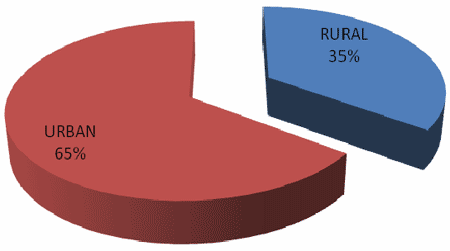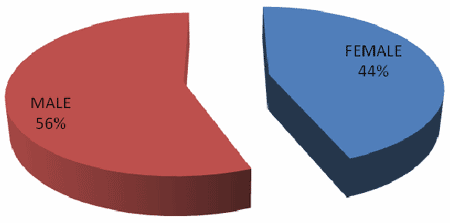Chapter 3: The Status of People with Disabilities in Bolivia

People with disabilities by region
Due to the high population growth rate in Bolivia in recent years, the number of people with disabilities has increased. According to membership data of the Departmental Committees for People with Disabilities, there are approximately 30,000 people with disabilities, with a large concentration (66%) living in the capital cities. Due to the higher level of poverty found in rural areas, these people have been forced to immigrate to urban centres in search of a better life.
In Bolivia, people with disabilities are affiliated with different organizations, including: the Christian Fraternity for the Sick and Disabled; the Federation of Integrated Wheelchair Sports, the Bolivian Federation for the Deaf; the Bolivian Association of Parents of Children and Adolescents with Mental Disabilities and the Bolivian Federation for the Deaf and Blind. All of these organizations are grouped under the umbrella organization, the Bolivian Confederation of Persons with Disabilities.
3.1 Current Situation
Currently, according to surveys conducted by the I.N.E. (National Institute of Statistics) and the U.N.D.P. (United Nations Development Program), 63% of people with disabilities have limited resources and are categorized as poor, the majority of whom do not have access to housing, education or health services. Sixty six percent are unemployed or hold informal jobs (selling jams, telephone cards, etc.), while only 35% are employed, with very few earning above the national minimum wage (577 Bs).

People with disabilities by sex
The same studies also show that 56% of people with disabilities are men and 44% are women, which is another limiting factor for family incomes, since it is males who bring in income and are better paid than women.
In terms of access to education and professional training, approximately 43% of people with disabilities are illiterate; that is, they are unable to read or write, or have very limited skills.
Of the total number of interviewees in the study, only 43% had finished elementary school and a mere 14% had had access to professional training at a college or university level. In the majority of cases, this lack of access to technical or professional training is due to the limited financial resources of the family. Others come from rural areas and did not have access to primary-level education as children, and a smaller yet significant percentage did not have access to higher education due to barrier issues; most universities, colleges and technical schools have numerous floors and flights of stairs, and many lack special access routes for people with physical disabilities.
3.2 Organizations Working with People with Disabilities
a) C.O.B.O.P.D.I. - (Bolivian Confederation of Persons with Disabilities).
C.O.B.O.P.D.I. is a representative, non-profit civil society advocacy organization, and with legal status, number 372/96. Its affiliate members are the nine departmental federations, and national institutes and organizations that are dedicated to rehabilitation, habilitation and the active inclusion of people with disabilities in society. They include:
- A.B.O.P.A.N.E.: Bolivian Association of Parents and Friends of Persons with Mental Disabilities.
- F.E.N.A.C.I.E.B.O.: National Bolivian Federation for the Blind
- F.E.B.O.S.: Bolivian Federation for the Deaf
- F.R.A.T.E.R.: Christian Fraternity of Persons with Disabilities
- F.E.B.O..P.S.O.C.I.: Bolivian Federation for the Deaf and Blind
- A.S.P.A.N.I.M.I.S.: Parents’ Association of Children with Multiple Disabilities
Across its various federations and associations, C.O.B.O.P.D.I. has a membership of between 20,000 and 25,000 people with disabilities, of which 65% are active members.
The confederation was founded on October 8, 1989, in Viacha (La Paz), Bolivia, legal status, Number 372. Since then, six national conferences have taken place, in which the governing C.O.B.O.P.D.I. Executive Boards have been elected.
The organization emerged out of a need for an institution specializing in human rights claims for people with physical disabilities.
C.O.B.O.P.D.I. was instrumental in getting Law 1678 passed on November 15, 1995, and its Supreme Decree 24807 on August 4, 1997, as a result of the radical actions (marches, hunger strikes, blockades) presented to the executive and legislative powers.
C.O.B.O.P.D.I.’s vision is to be a representative organization of citizens with disabilities, setting the example and as the main actors in the process of building an inclusive society with social justice and democratic equity.
Its mandate is to ensure the enforcement of human rights for citizens with disabilities in Bolivia, so that they may have access to equal opportunities and attain full social integration.
C.O.B.O.P.D.I. bases its action on the specifications set out by the World Programme of Action, Standard Rules, international agreements, and current laws for people with disabilities on impairments, disabilities, handicaps, prevention, rehabilitation and habilitation.
- To arrange actions to help its member organizations attain their goals.
- To coordinate with government at the national, departmental and provincial levels.
- To coordinate with other organizations working on disability issues, including N.G.O.s, foundations, national and international teams and volunteers, to address the needs and demands of people with disabilities.
- To organize services that strengthen institutions and inter-institutional links, coordinating between C.O.B.O.P.D.I. - affiliated institutions and organizations that provide professional training for their members in the areas of leadership, management training and general orientation.
- To hold meetings with government officials and other authorities with the goal of placing disability issues on the agenda and facilitating their application with respect to legal matters, citizen participation, political decision-making and the electoral process.
- To carry out inter-institutional agreements with public and private organizations in civil society, and national and international institutions, in order to achieve C.O.B.O.P.D.I. objectives.
- To demand the observance of laws and norms related to disability rights.
- To coordinate activities with organizations and institutions of parents, teachers and colleagues of people with disabilities.
- To coordinate and promote action with C.O.N.A.L.P.E.D.I.S., the C.O.D.E.P.E.D.I.s, departmental federations and national organizations.
- To participate in social movements by joining forces with citizens groups at every level in order to gain access to decision-making processes.
C.O.B.O.P.D.I. has its headquarters in the city of Santa Cruz and holds a permanent office there.
b) C.O.N.A.L.P.E.D.I.S. (National Committee of Persons with Disabilities)
The National Committee of Persons with Disabilities, which is the executive body of Law 1678, was established on October 15, 1996.
The Board of Directors includes:
- a representative of the Ministry of Health;
- a representative of the Ministry of Education;
- a representative of the Ministry of Labour;
- a representative of an N.G.O. working in the area of disability, and
- four representatives of the Bolivian Confederation of People with Disabilities (C.O.B.O.P.D.I.).
From these eight people, one representative of C.O.B.O.P.D.I. is chosen to act as Executive Director, who then works at the permanent office jointly with a lawyer, an economist and a secretary.
It is a decentralized entity, whose representatives are delegated to work on five main policies. Some advances have already been made, such as:
- Short-Term Insurance Agreement: the confederation signed an agreement with the Ministry of Labour for short-term insurance on September 29, 2004, which is currently pending due to the country’s internal problems and the coming change in government.
- Complementary Hydrocarbons Tax (I.H.C.): In October 2004, the Lower Chamber approved the dedication of 2% of the Hydrocarbon Law funds—Co-participation Article 52, clause C—to the Bolivian Confederation of Persons with Disabilities for institutional strengthening and the fulfilment of objectives. Once the current political crisis in Bolivia is resolved, the executive will determine how this percentage will be distributed.
- Human Rights: With respect to human rights issues, C.O.B.O.P.D.I. is working on developing a national legal strategy that would allow Bolivia to present itself to the international community as a state with public policy based on respect for and the protection and fulfilment of human rights. It would also establish and modify national and local human rights instances, with the objective of promoting the diversity of sources, approaches, methodologies, and institutions. In this context, human rights representatives are working with groups vulnerable to societal discrimination in order to create a protection law in which people with disabilities are taken into account.
- Constituent Assembly: The process to participate in the Constituent Assembly began with the organization of the workshop “Equal Rights, Justice and Equity for People with Disabilities in the New Political Constitution of the State,” held in November 2004. Currently, C.O.N.A.L.P.E.D.I.S. is working so that two people with disabilities can present the proposal to the head of disabilities in the Constituent Assembly. The objective of the proposal is to build and/or design a Political Constitution of the State in which people with disabilities, who are currently discriminated against and excluded, will be included and recognized.
-
Inter-institutional Coordination: The Confederation has participated in several events organized by different institutions, with the purpose of strengthening actions in favour of people with disabilities:
- Seminar workshop: Political Impact and Work in Networks, organized by the Y.A.N.A.P.A.S.I.N.A. project, Caritas Germany
- Seminar workshop: National Plan for Equality and Equalization of Opportunities of People with Disabilities, organized by C.O.N.A.L.P.E.D.I.S., Ombudsperson.
- Roundtable discussion: National Strategy on Human Rights, organized by C.O.B.O.P.D.I., C.O.N.A.L.P.E.D.I.S., Community of Human Rights.
- Seminar workshop: National Strategy on Information and Communication Technologies for Development, organized by Telecommunications Commission, U.N.D.P. Bolivia, National Program TIC-Bolivia
c) C.O.D.E.P.E.D.I.S. (Departmental Committee of Persons with Disabilities)
C.O.D.E.P.E.D.I.S. is a departmental-level organization, whose objective is: “To improve the quality of life of people with disabilities in the department of Santa Cruz, using specialized municipal care units for people with disabilities. Strengthening of associations.”
As mentioned above, there are other institutions, associations, federations, and fraternities that bring together and work for the well-being of people with disabilities in each department; each one has its particular agenda and work plan.
